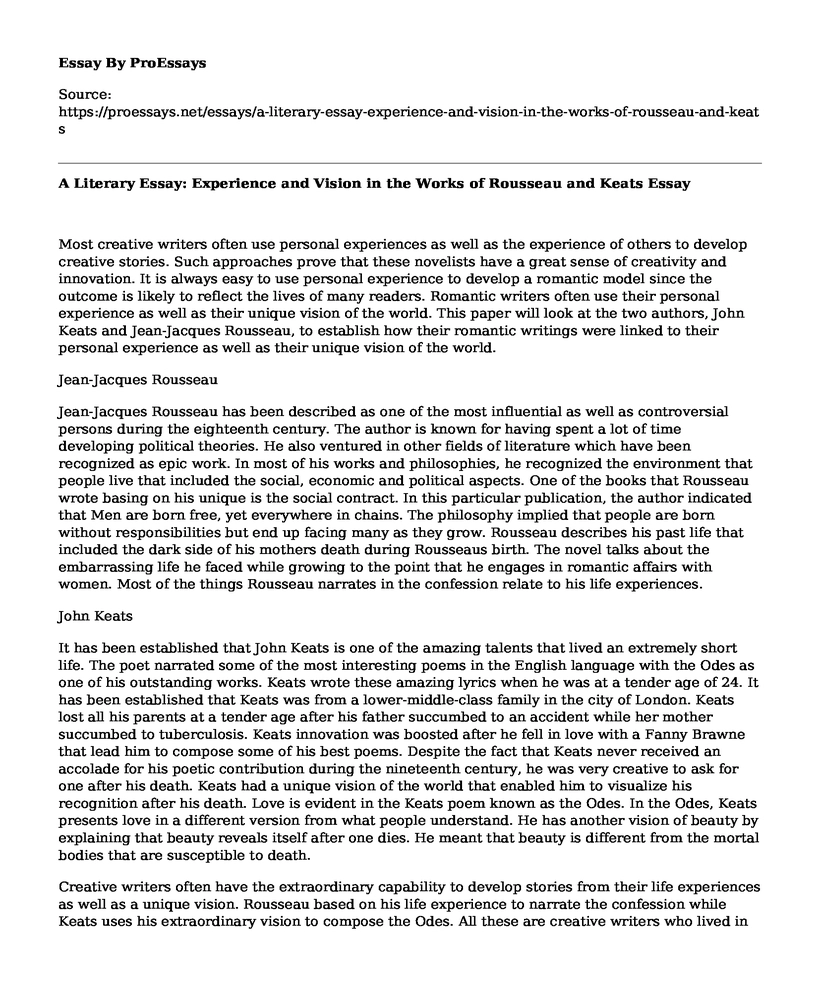Most creative writers often use personal experiences as well as the experience of others to develop creative stories. Such approaches prove that these novelists have a great sense of creativity and innovation. It is always easy to use personal experience to develop a romantic model since the outcome is likely to reflect the lives of many readers. Romantic writers often use their personal experience as well as their unique vision of the world. This paper will look at the two authors, John Keats and Jean-Jacques Rousseau, to establish how their romantic writings were linked to their personal experience as well as their unique vision of the world.
Jean-Jacques Rousseau
Jean-Jacques Rousseau has been described as one of the most influential as well as controversial persons during the eighteenth century. The author is known for having spent a lot of time developing political theories. He also ventured in other fields of literature which have been recognized as epic work. In most of his works and philosophies, he recognized the environment that people live that included the social, economic and political aspects. One of the books that Rousseau wrote basing on his unique is the social contract. In this particular publication, the author indicated that Men are born free, yet everywhere in chains. The philosophy implied that people are born without responsibilities but end up facing many as they grow. Rousseau describes his past life that included the dark side of his mothers death during Rousseaus birth. The novel talks about the embarrassing life he faced while growing to the point that he engages in romantic affairs with women. Most of the things Rousseau narrates in the confession relate to his life experiences.
John Keats
It has been established that John Keats is one of the amazing talents that lived an extremely short life. The poet narrated some of the most interesting poems in the English language with the Odes as one of his outstanding works. Keats wrote these amazing lyrics when he was at a tender age of 24. It has been established that Keats was from a lower-middle-class family in the city of London. Keats lost all his parents at a tender age after his father succumbed to an accident while her mother succumbed to tuberculosis. Keats innovation was boosted after he fell in love with a Fanny Brawne that lead him to compose some of his best poems. Despite the fact that Keats never received an accolade for his poetic contribution during the nineteenth century, he was very creative to ask for one after his death. Keats had a unique vision of the world that enabled him to visualize his recognition after his death. Love is evident in the Keats poem known as the Odes. In the Odes, Keats presents love in a different version from what people understand. He has another vision of beauty by explaining that beauty reveals itself after one dies. He meant that beauty is different from the mortal bodies that are susceptible to death.
Creative writers often have the extraordinary capability to develop stories from their life experiences as well as a unique vision. Rousseau based on his life experience to narrate the confession while Keats uses his extraordinary vision to compose the Odes. All these are creative writers who lived in the eighteenth and nineteenth centuries respectively.
Cite this page
A Literary Essay: Experience and Vision in the Works of Rousseau and Keats. (2021, Apr 14). Retrieved from https://proessays.net/essays/a-literary-essay-experience-and-vision-in-the-works-of-rousseau-and-keats
If you are the original author of this essay and no longer wish to have it published on the ProEssays website, please click below to request its removal:
- Willy from The Death of A Salesman: Character Analysis Essay
- Paper Example on Modern Rangers: Ethics and Leadership
- Ethical Conducts Essay Example
- Book Review on All Shook Up by Glenn C. Altschuler Paper Example
- Creating Harmony: Elements of a Poem - Essay Sample
- Ethics: The Study and Development of Moral Standards - Essay Sample
- Passing By Nella Larsen - Book Review Example







